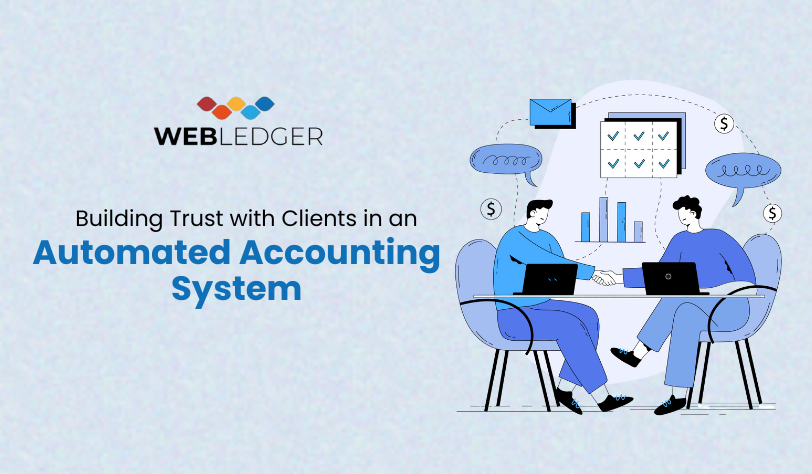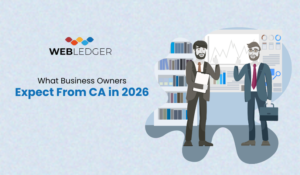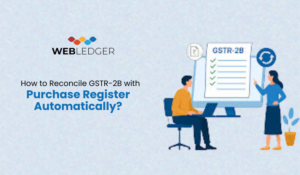
Building Trust with Clients in an Automated Accounting System
In today’s fast-evolving financial landscape, automation is no longer a thing of the distant future but an intrinsic part of modern CAs. Considering the rapid shift toward digital accounting, professionals from all parts of India are finding that technology is just not enough; the real success of the accounting system depends on one crucial factor: trust.
Automation does ensure accuracy, speed, and efficiency, but the clients need to believe in the technology and experts deploying it. Building that very trust is a foundation of long-term success for every CA practice in this age of accounting automation. An age of automated accounting helps to build trust among clients while tackling the challenges at the very same time.
Why Trust Matters in Automated Accounting
Trust has always been the cornerstone for any relationship in finance. When clients entrust their financial information, they expect confidentiality, precision, and integrity. Automation doesn’t change these expectations – it extends them.
As systems become smarter and increasingly interconnected, clients are looking for even greater assurance that their information will be safeguarded and that automated processes reflect human judgment. Therefore, CAs need to combine technical excellence with emotional intelligence by leveraging technology to develop closer, not more remote, relationships.
Understanding the Challenges in Building Trust
The practice of digital accounting does face a set of challenges. Clients can be uncomfortable with change, perhaps fearing the loss of the “human” side of financial collaboration.
1. Data Security Concerns
Cyber threats are growing day by day. In order to make customers feel confident, all their financial information within the accounting system should be guaranteed to be secured using encryption, multi-factor authentication, and regular audits.
Webledger
Please enter the OTP below to proceed.
2. Complexity of Technology
Many find automation intimidating. It is very important that CAs should simplify explanations for their clients by showing that automation enhances accuracy, rather than replacing expertise.
3. Lack of Personal Interaction
Automation can feel impersonal. It’s all about the balance between technology and real communication: staying in touch, informed, and engaged.
Practical Strategies to Build and Maintain Trust
1. Data Security and Compliance
Security is non-negotiable: CAs shall use top-grade encryption, firewall protection, and access control. Periodic audits and compliance with GST, Income Tax, and data privacy laws ensure the highest standards of integrity.
Tip: Regular training on the security measures on the platform enhances trust and helps in building transparency.
2. Enhance Transparency Through Better Communication
Automation is powerful, but in order for the clients to trust it, they need to understand how it works. Provide walkthroughs and frequently asked questions, and reports that describe how the accounting system processes data.
Real-time dashboards and automated reports further reinforce transparency to keep all clients abreast of all updates or reconciliations.
3. Keep It Personal
Automation should not replace, but complement, human interaction. Use the time freed by automation in accounting for personalized financial counseling.
Schedule periodic review meetings where you share insights into performance, keeping the lines of communication effective. In this setting dominated by technology, this makes your clients feel valued.
4. Use Technology to Enhance Service Quality
Technology is here to help you upgrade your practice, not just automate it. Automate the mundane tasks of ledger entries, reconciliations, and tax filings. Then harness AI-powered analytics to deliver actionable financial insights driving real business growth for clients.
This builds deeper, trust-based relationships through the shift from transactional to advisory accounting.
Accounting by Artificial Intelligence
Among all the automation tools that are on their way, WebLedger is a sure and digitally enabled platform for today’s practicing Chartered Accountants. Advanced automation coupled with ease of use helps CAs achieve both operational efficiency and client satisfaction.
Benefits for Businesses
Data Entry Automation
- Auto-extract data from Excel, PDFs, and invoices.
- Saves time and eliminates manual errors.
GST Reconciliation
- Automatically matches and reconciles GST records.
- Verifies full compliance, ensuring accuracy.
Document Management
- Cloud storage security for all client files.
- Centralized, easy-to-access repository.
Client Management
- Assigns roles and permissions for teams.
- Improves visibility and accountability of workflow.
Advanced Analytics
- AI-powered insights for better decision-making.
- Helps CAs provide data-backed financial advice.
Benefits for Chartered Accountants
Improved Efficiency
Because the routine work is automated, freeing up quality time for advisory services.
Fewer Errors
Consistent automation considerably reduces data inaccuracies.
Improved Client Relationships
With the automation of routine work, a CA can devote more time to understanding the goals of their clients.
Improved Compliance
Automated systems are updated with changing regulations for peace of mind for the accountant and the client.
Manual and Automated Accounting Systems
| Aspect | Manual Accounting | Automated Accounting |
|---|---|---|
| Time Requirement | Labor-intensive and time-consuming | Fast and efficient |
| Error Rate | Higher due to manual entries | Minimal because of automation |
| Client Engagement | Limited due to workload | More time to consult |
| Compliance | Manual updates required | Auto-updated as per changes in regulation |
Building Trust Through Automation
The future of CA practices is at the crossroads of human expertise and intelligent technology. Building trust in an automated environment is not about cybersecurity or compliance, but about communication, personalization, and consistent value creation.
Solutions like WebLedger will go a long way in proving to clients that automation does not replace humans but empowers them. The right accounting system bolsters reliability, strengthens relationships, and lays a base for growth in the new era of digital accounting.
Frequently Asked Questions (FAQs)
1. Why is trust important in automated accounting?
Because clients share sensitive financial information, trust means making them feel secure and confident in the automated process and its results.
2. How does accounting automation efficiency improve?
Automation reduces manual work, minimizes errors, and accelerates processes such as data entry, reconciliation, and compliance tracking.
3. How might CAs retain human contact in automated processes?
It saves time through the use of automation on repetitive tasks and focuses that time on client engagement and strategic consultation.
4. What makes WebLedger a reliable accounting automation tool?
WebLedger provides advanced AI-driven features, real-time insights, strong security, and compliance-ready functionalities that enable smarter working and building of stronger relationships with clients.




